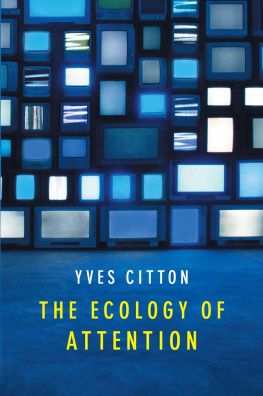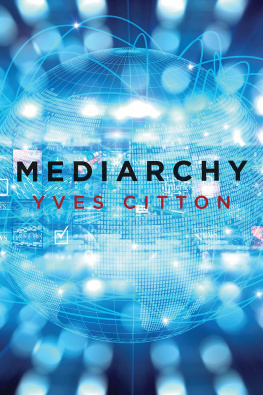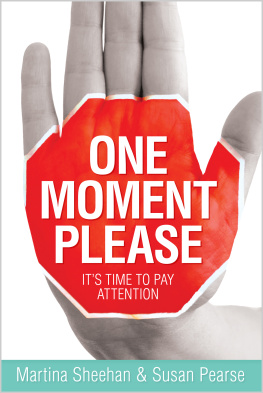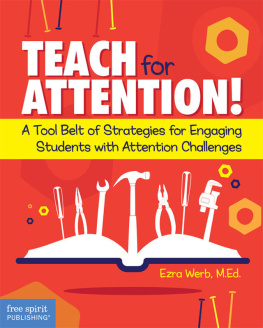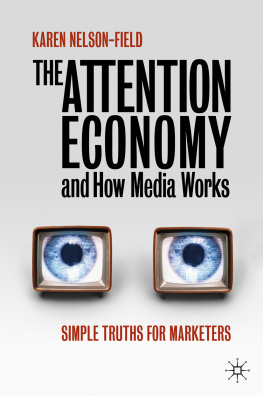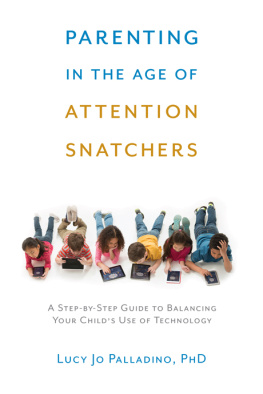Contents
Guide
Pages

To the Kolkata family,
those who left, those who remain
The Ecology of Attention
Yves Citton
Translated by Barnaby Norman
polity
First published in French as Pour une cologie de lattention, ditions du Seuil, 2014
This English edition Polity Press, 2017
P. viii, 2 + 2 = 5. Words and music by Thomas Edward Yorke, Philip James Selway, Edward John OBrien, Jonathan Richard Guy Greenwood and Colin Charles Greenwood Warner/Chappell Music Ltd (PRS). All rights administered by WB Music Corp.
Polity Press
65 Bridge Street
Cambridge CB2 1UR, UK
Polity Press
350 Main Street
Malden, MA 02148, USA
All rights reserved. Except for the quotation of short passages for the purpose of criticism and review, no part of this publication may be reproduced, stored in a retrieval system, or transmitted, in any form or by any means, electronic, mechanical, photocopying, recording or otherwise, without the prior permission of the publisher.
ISBN-13: 978-1-5095-0376-6
A catalogue record for this book is available from the British Library.
Library of Congress Cataloging-in-Publication Data
Names: Citton, Yves, author.
Title: The ecology of attention /Yves Citton.
Other titles: Pour une ?ecologie de lattention. English
Description: English edition. | Malden, MA : Polity Press, 2016. | Includes bibliographical references and index.
Identifiers: LCCN 2016020587| ISBN 9781509503728 (hardback : alk. paper) | ISBN 9781509503735 (pbk. : alk. paper)
Subjects: LCSH: Attention--Social aspects. | Perceptual learning.
Classification: LCC HM1176 .C5713 2016 | DDC 153.7/33--dc23 LC record available at https://lccn.loc.gov/2016020587
The publisher has used its best endeavours to ensure that the URLs for external websites referred to in this book are correct and active at the time of going to press. However, the publisher has no responsibility for the websites and can make no guarantee that a site will remain live or that the content is or will remain appropriate.
Every effort has been made to trace all copyright holders, but if any have been inadvertently overlooked the publisher will be pleased to include any necessary credits in any subsequent reprint or edition.
For further information on Polity, visit our website: politybooks.com
ACKNOWLEDGEMENTS
Many thanks to Emmanuel Alloa, Alejandro Alvarez, Emily Apter, Maryvonne Arnaud, Bernard Aspe, Marc Bacchetta, Thierry Bardini, Christine Baron, Sarina Basta, Jacques Berchtold, Laurent Bigorgne, Aurlien Blanchard, Jean-Pierre Bobillot, Vronique Bolhuis, Robert Bonamy, Daniel Bougnoux, Dominique Boullier, Patrick Bourgne, Sylvain Bourmeau, Frdric Brun, Graham Burnett, Rosemary and Gilbert Citton, Jonathan Crary, Isabelle Creusot, Jrme David, Christophe Degoutin, Xavier de la Porte, Georges Didi-Huberman, Estelle Doudet, Marianne Dubacq, Franois-Ronan Dubois, Cdric Duroux, Rita Felski, Georg Franck, Igor Galligo, Aurlien Gamboni, Florent Gaudez, Mlanie Giraud, Francis Goyet, Michael Hagner, Christophe Hanna, Pierre Hazan, Denis Hollier, Michel Jeanneret, Dominiq Jenvrey, Nedjima Kacidem, Deborah Knopp, Charlotte Krauss, Isabelle Krzywkowski, Jean-Pierre Lachaux, Marina and all the Kundu family, Daniel Lanon, Catherine Langle, Raphal et Catherine Larrre, Bruno Latour, Benot Laureau, Maurizio Lazzarato, Pierre Le Quau, Fabienne Martin-Juchat, Jean-Franois Massol, ric Mchoulan, Varinia Michalun, Bernard Mige, Rajarshi et Ranjini Mitra, Valeria Morera, Philippe Mouillon, Yann Moulier Boutang, Romi Mukherjee, the editorial committee of the journal Multitudes, Carole Musset, Frdric Neyrat, Laura von Niederhusern, Christine Noille-Clauzade, Charlotte Nordmann, Franois Noudelmann, Franoise Notter-Truxa, The Order of the Third Bird, Isabelle Pailliart, the participants in the conomie de lattention et archologie des media seminars at the Universit de Grenoble, Matteo Pasquinelli, Jean-Franois Perrin, Philippe Petit, Dominique Pety, Julien Piat, Julien Pierre, Claire Pignol, Martial Poirson, Catherine Quloz, Anne Querrien, Dominique Quessada, Anne-Julie Raccoursier, Gene Ray, Philippe Rgnier, le Revue des livres, Julie Ridard, Claudia Roda, Stphanie Roussel, Dario Rudy, Liliane Schneiter, Jean-Paul Sermain, Jean-Claude Serres, the Settembrini family, Adrien Staii, Bernard Stiegler, Henry Torgue, Isabelle Treff, Nicolas Truong, Urs Urban, Marco Venturini, Jrme Vidal, the team of the Villa Gillet, Slaven Waelti, Guy Walter, Olivier Zerbib.
Very special thanks to Hugues Jallon and Bruno Auerbach for helping me to frame and realize this project.
Are you such a dreamer
To put the world to rights?
Ill stay home forever
Where two and two always makes up five
Ill lay down the tracks, sandbag and hide
January has Aprils showers
And two and two always makes up five
Its the devils way now
There is no way out
You can scream and you can shout
It is too late now
Because
YOU HAVE NOT BEEN
PAYING ATTENTION
Radiohead, The Lukewarm (2 + 2 = 5)
FOREWORD
A book dealing with the exhaustion of our attentional resources is a living contradiction: it explains to you why you will not have had time to read it. Our house is on fire, from minor daily emergencies to climate imbalance and often in conflicting ways, coupling one persons drought with the prediction of anothers flood, threatening even entire cities like Kolkata. And we look elsewhere. We fail to read the writing getting ever bigger on the wall. Burn before reading!
It would have been better to write a tweet, or a blog post for viral distribution not a book, composed of sequential chapters and complete sentences. This either proves that we do not believe what we say: our attention is not as threatened, scattered, shattered and maimed as people claim. Or it is a futile effort: this book demonstrates that it cannot be read.
We will have to hedge our bets. Go much too quickly and much too slowly at the same time. Write incomplete sentences that are already far too long. Go into the details and ignore essential points. Be simultaneously too inflexible, too pretentious, too learned, and too cavalier.
In order to suggest different reading rhythms, the route will be punctuated by a hundred or so KEY-EXPRESSIONS, written in capitals, and accompanied on each occasion by a concise definition in italics. Readers in a hurry can gain an initial idea of the concepts discussed in the chapter, and only linger over those which are of direct interest. Through this system, the book will put forward a battery of concepts, principles, maxims and hypotheses, for which it will seek to provide rigorous initial definitions hoping in this way to furnish a more precise vocabulary with which to explore, decipher and cultivate the surprisingly underinvestigated field of what may become an attention ecology.
Advertising, literature, artistic experimentation, television, on-line courses, credit agencies, search engines, live performance, militant gardening, political organizations: over the course of the following chapters, we will touch on all these areas. For each of them, we will try to understand better how our various environments condition our individual and collective attention, and how, from the moment we start to reconfigure these environments, we do retain a certain power over our own fate. In a certain way, our attention is the thing that is most particular to us. And yet, it is only available to us as something to be alienated both in the capturing apparatuses in which we are immersed by consumer capitalism and in the aesthetic experiences into which we dive most passionately.

